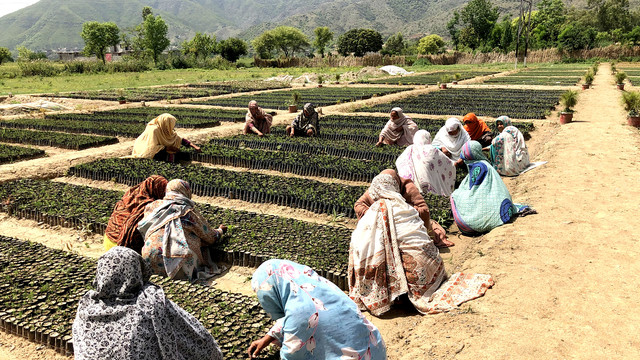Dryland Sustainable Landscapes Impact Programme
As part of the Global Environment Facility Dryland Sustainable Landscapes Impact Programme, IIED and partners of the Forest and Farm Facility are providing business incubation support around country-specific core themes to forest and farm producer organisations in the Miombo Mopane ecoregion of Angola, Botswana, Malawi, Namibia, Tanzania and Zimbabwe.

The Dryland Sustainable Landscapes Impact Programme project logo
As part of the Global Environment Facility Dryland Sustainable Landscapes Impact Programme, IIED and partners of the Forest and Farm Facility are providing business incubation support around country-specific core themes to forest and farm producer organisations in the Miombo Mopane ecoregion of Angola, Botswana, Malawi, Namibia, Tanzania and Zimbabwe
Agriculture is expanding rapidly to feed growing populations in the Miombo and Mopane woodlands of sub-Saharan Africa. This expansion results in deforestation, forest degradation, and the loss of species and ecosystem services.
The remaining woodland is an increasingly vital support system for local farming communities as it maintains ecosystem services such as soil fertility, pollination and water cycles while also providing a range of products from wood energy and construction materials, to wild foods, medicines and cosmetics.
The Dryland Sustainable Landscapes Impact Programme (DSL-IP) aims to avoid, reduce and reverse further degradation, desertification and deforestation of land and ecosystems in drylands, through the sustainable management of production landscapes – both farms and remaining forest patches.
Led by the Food and Agriculture Organization of the United Nations (FAO), IIED will work with colleagues from FAO’s Farmer Field School and Community Seed Bank units to roll out an integrated technical support package called the Sustainable Landscape Production Framework (SLPF).
This will provide integrated technical support on seed conservation, sustainable land management and green value chain development to six ‘child projects’ tasked with a country-driven approach aimed at accelerating transformational and durable changes in dryland landscapes at scale.
The broader DSL-IP covers 11 countries across three regional platforms for Central Asia, Sahel/East Africa and the Miombo/Mopane ecoregion in Southern Africa (with which IIED’s work is linked).
The programme aims to integrate approaches and support collaboration across a range of initiatives and organisations, including work on land degradation neutrality, tenure, agroecology, sustainable forest management, sustainable landscape management, seedbank management, green value chains and private sector linkages.
What is IIED doing?
IIED will represent the Forest and Farm Facility (FFF) with its vision of making forest and farm producer organisations (FFPOs) the key change agents for delivering climate-resilient landscapes and improved livelihoods.
Alongside business incubation training and support, it will link FFPOs and ‘child project’ governments and technical support partners in Angola, Botswana, Malawi, Namibia, Tanzania and Zimbabwe to the wider FFF network with its knowledge networks and support mechanisms.
The institute’s contribution will focus on developing sustainable and bankable businesses for dryland commodity value chains that incentivise sustainable dryland management. This will involve:
- Suggestions for optimal implementation and capacity development arrangements within DSL-IP
- Outreach and training activities at regional and national levels within an integrated capacity development and implementation plan
- Developing and delivering training materials and detailed reports about sustainable and climate-resilient business incubation, risk management and access to finance
- Providing ongoing mentoring for FFPO business incubation, and the production of case studies of innovative FFPO forest and farm models and sustainable land and forest management practices in dryland landscapes
- Supporting the drafting of communication and advocacy strategies for national farmer unions or federations to pursue a more enabling policy environment in each country, and
- Publishing briefing and discussion papers on protocols for the inclusion of FFPOs in multi-stakeholder platforms relevant to dryland sustainable landscapes; and cooperation approaches for FFPO investment and certification mechanisms in support of dryland sustainable landscape management.
Additional resources
The Forest and Farm Facility (FFF) approach: delivering climate-resilient landscapes and improved livelihoods, Duncan MacQueen (2022), Working paper



